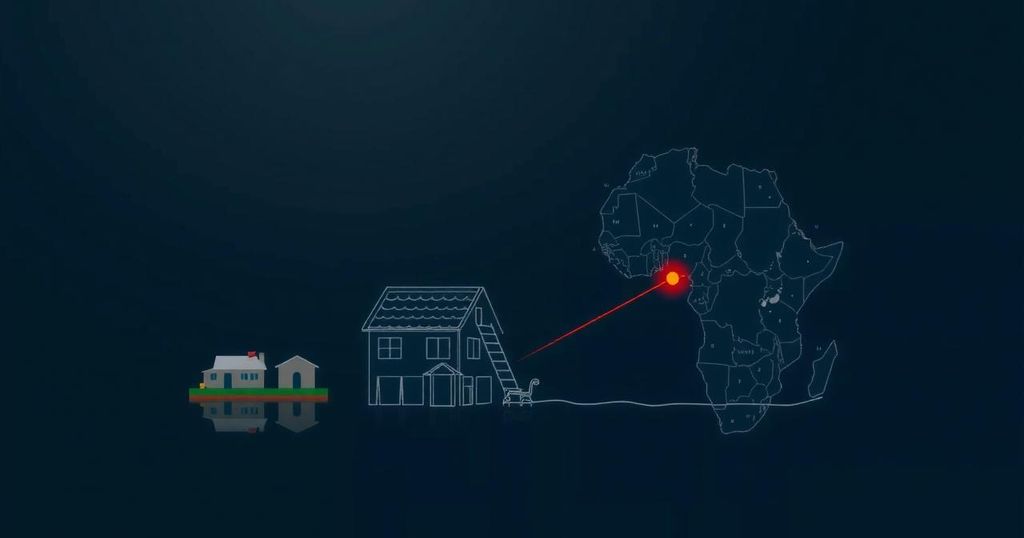Severe flooding across Chad, Nigeria, and Cameroon has affected over 2.7 million individuals, causing significant destruction of homes and farmland. The humanitarian organization Action Against Hunger calls for urgent funding and support to assist the most vulnerable populations who face critical shortages in food, water, and shelter due to the devastating impact of the floods.
Recent severe flooding has severely impacted Chad, Nigeria, and Cameroon, affecting over 2.7 million individuals. In Chad alone, 1.7 million people have been affected, while Nigeria faces a crisis impacting about a million, and more than 230,000 individuals are suffering in Cameroon. Action Against Hunger has urgently called for funding to facilitate an immediate emergency response to assist the most vulnerable populations in these regions, which have suffered extensive damage to homes and farmland due to relentless torrential rains. In Chad, widespread flooding occurred primarily across the Lac, Mayo-Kebbi Est, Mandoul, Tandjilé, and Batah provinces, beginning in late July. The devastation has resulted in over 500 fatalities, the destruction of more than 210,000 houses, the inundation of 880,000 acres of farmland, and the loss of approximately 70,000 cattle, exacerbating food insecurity, as 3.4 million people in Chad were already facing hunger. Gusatve Gnagny, the Country Director for Action Against Hunger in Chad, emphasized the critical needs for food, water, shelter, and healthcare, stating, “According to initial estimates, nearly $100 million is needed to bring relief to these stricken populations. So far, barely 10% of this sum has been mobilized.” In Nigeria, states such as Borno, Adamawa, Bauchi, Enugu, Jigawa, Kano, Bayelsa, and Yobe are grappling with the impacts, where countless individuals have been left homeless and without food. Prior to the flooding, more than 32 million Nigerians were already experiencing severe food insecurity. The state capital of Maiduguri witnessed over 50% of its area submerged, compounding the plight of 414,000 affected individuals. Thierno Samba Diallo, Country Director for Action Against Hunger in Nigeria, noted that “The floods have damaged over 300,000 acres of farmland in Nigeria,” which is likely to worsen the food insecurity scenario. Cameroon has also faced significant challenges, particularly in the Far-North region, where around 236,000 people are affected, and over 30,000 acres of crops have been destroyed. Pascal Maillard, the Country Director for Action Against Hunger in Cameroon, expressed concerns about collapsing infrastructure and resultant displacements, stating, “The priority needs are food, shelter and essential household items, as well as access to water, hygiene and sanitation.” The frequency of climate-related shocks is increasing in these nations, with the recent flooding severely jeopardizing fragile livelihoods and agricultural production. Action Against Hunger has been actively working in these regions to provide nutritional, health, and sanitation support, emphasizing the urgent need for external humanitarian assistance to help affected communities recover and become resilient to future climatic changes.
The ongoing flooding crisis in Chad, Nigeria, and Cameroon is a direct consequence of the exacerbating climate crisis affecting access to essential resources such as clean water and food. These governments are grappling with the consequences of climate change and the impact of related humanitarian crises, including the influx of refugees due to conflicts like the civil war in Sudan. In regions where food insecurity was already a pressing issue, these new challenges threaten the stability and health of millions, underscoring the critical need for effective emergency response measures and international support.
The flooding crisis across Chad, Nigeria, and Cameroon has led to significant humanitarian needs, affecting millions whose livelihoods and access to basic resources have been devastated. Action Against Hunger’s appeal for financial assistance is pivotal in addressing the urgent needs for food, water, shelter, and health care in these regions. With the increase in climate-related disasters, it is crucial to strengthen resilience strategies to support vulnerable populations in facing future crises.
Original Source: www.actionagainsthunger.org






